| Srl | Item |
| 1 |
ID:
110792
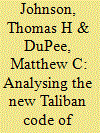

|
|
|
|
|
| Publication |
2012.
|
| Summary/Abstract |
Periodically, Afghanistan's Taliban leadership formally issues Layeha or 'codes of conduct' for their fighters and supporters. Layeha offer important insights into the Afghan Taliban's objectives, strategies and the psyche/perspective of Taliban leadership. This article presents an analysis of the Taliban's code of conduct and examines what Layeha tell us about Taliban objectives, strategy and organization. Such information would seem particularly important as the United States as well as its coalition allies assess their Afghan operational strategy as well as exit strategy from Afghanistan. This analysis of the Layeha suggests that the Taliban remain most concerned with: chain of command principles preventing the fragmentation of the various Taliban networks; obtaining and maintaining public support by winning 'hearts and minds' of local residents; ensuring enough fighters remain engaged in combat; and galvanizing the perception that the Taliban represent a capable, desirable and fair alternative to the current Afghan political establishment.
|
|
|
|
|
|
|
|
|
|
|
|
|
|
|
|
| 2 |
ID:
103964
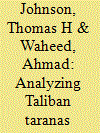

|
|
|
|
|
| Publication |
2011.
|
| Summary/Abstract |
This article describes and analyzes a little understood Afghan Taliban propaganda tool: chants or taranas. These melodic refrains effectively use historical narratives, symbology, and iconic portraits. The chants are engendered in emotions of sorrow, pride, desperation, hope, and complaints to mobilize and convince the Afghan population of the Taliban's worldview. The chants represent culturally relevant and simple messages that are communicated in a narrative and poetic form that is familiar to and resonates with the local people. They are virtually impossible for the United States and NATO to counter because of Western sensitivities concerning religious themes that dominate the Taliban narrative space, not to mention the lack of Western linguistic capabilities, including the understanding and mastering the poetic nature of local dialects.
|
|
|
|
|
|
|
|
|
|
|
|
|
|
|
|
| 3 |
ID:
074923
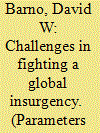

|
|
|
|
|
| Publication |
2006.
|
| Summary/Abstract |
The strategic nature of war has changed, and our military and government are striving to adapt to fight and win in this new environment. Today we are engaged in a global counterinsurgency, an unprecedented challenge which requires a level of original strategic thought and depth of understanding perhaps comparable only to that of the Cold War. Our ongoing political-military actions to achieve success in Iraq and Afghanistan are simply subordinate efforts of this larger, complex world war.
|
|
|
|
|
|
|
|
|
|
|
|
|
|
|
|
| 4 |
ID:
098744
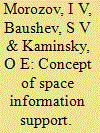

|
|
|
| 5 |
ID:
151875
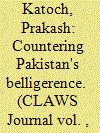

|
|
|
| 6 |
ID:
087554
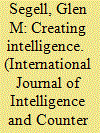

|
|
|
|
|
| Publication |
2009.
|
| Summary/Abstract |
Intelligence is not just about gathering and analyzing information. It is also about the provision of information. This information is provided by specific operations task forces that are now integral units in any military operation. The purpose of these units is neither deception nor the provision of misinformation to a military adversary. Instead, their purpose is to persuade a target population not to support an adversary and to dissuade any activity that might hamper allied victory. Offering the adversarial population a realistic better future than the opposition leadership or terrorists are able to offer-done through an information and psychological warfare campaign-can reduce casualties and the length of any armed conflict. But providing accurate information is essential for credibility. Manipulation of a population that provides manpower and other support to an adversary was deemed a prudent United States-Great Britain strategy in the Iraq conflict after the demise of the Baath regime.
|
|
|
|
|
|
|
|
|
|
|
|
|
|
|
|
| 7 |
ID:
111149
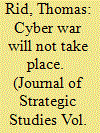

|
|
|
|
|
| Publication |
2012.
|
| Summary/Abstract |
For almost two decades, experts and defense establishments the world over have been predicting that cyber war is coming. But is it? This article argues in three steps that cyber war has never happened in the past, that cyber war does not take place in the present, and that it is unlikely that cyber war will occur in the future. It first outlines what would constitute cyber war: a potentially lethal, instrumental, and political act of force conducted through malicious code. The second part shows what cyber war is not, case-by-case. Not one single cyber offense on record constitutes an act of war on its own. The final part offers a more nuanced terminology to come to terms with cyber attacks. All politically motivated cyber attacks are merely sophisticated versions of three activities that are as old as warfare itself: sabotage, espionage, and subversion.
|
|
|
|
|
|
|
|
|
|
|
|
|
|
|
|
| 8 |
ID:
110833
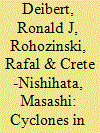

|
|
|
|
|
| Publication |
2012.
|
| Summary/Abstract |
While the rhetoric of cyber war is often exaggerated, there have been recent cases of international conflict in which cyberspace has played a prominent role. In this article, we analyze the impact of cyberspace in the conflict between Russia and Georgia over the disputed territory of South Ossetia in August 2008. We examine the role of strategic communications, information operations, operations in and through cyberspace, and conventional combat to account for the political and military outcomes of the conflict. The August 2008 conflict reveals some emergent issues in cyber warfare that can be generalized for further comparative research: the importance of control over the physical infrastructure of cyberspace, the strategic and tactical importance of information denial, the emergence of cyber-privateering, the unavoidable internationalization of cyber conflicts, and the tendency towards magnifying unanticipated outcomes in cyber conflicts - a phenomenon we call 'cyclones in cyberspace'.
|
|
|
|
|
|
|
|
|
|
|
|
|
|
|
|
| 9 |
ID:
181937
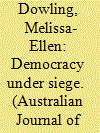

|
|
|
|
|
| Summary/Abstract |
In today’s virtually interconnected world, it is now cheaper, faster and less risky for malign foreign entities to conduct non-kinetic subversion of adversaries. This commentary aims to promote debate about whether digitisation has reshaped foreign interference or whether changes to the conduct of covert subversion operations simply mask what at its core is an unchanged and perennial fixture of geopolitics. It calls into question the concept of foreign interference in a world wherein the boundaries of foreign and domestic are beginning to dissolve in the digital theatre of battle. In this piece, I identify several core ways in which digitisation has revolutionised tactics of interference and argue that this differentiates today’s foreign interference from analogue-era espionage. I also explore how digitisation has expanded the range of potential threats and targets which has exacerbated the notorious cyber attribution problem and poses a unique threat to liberal democracies.
|
|
|
|
|
|
|
|
|
|
|
|
|
|
|
|
| 10 |
ID:
150130
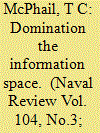

|
|
|
| 11 |
ID:
119127
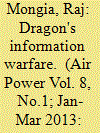

|
|
|
| 12 |
ID:
138981
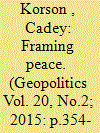

|
|
|
|
|
| Summary/Abstract |
Despite conducting sixty-six peacekeeping missions, the United Nations (UN) must repeatedly justify the necessity and wisdom of continuing these operations to the international community. Domestic success is contingent to a large degree on the willingness of citizens to cooperate with peacekeepers. Consequently, public perception in both the host country and abroad has become crucial to the continuation and maintenance of UN Peacekeeping Operations (UNPKO). A discourse analysis of domestic and international newspapers, radio transcripts, and television broadcasts about contemporaneous UNPKOs in Haiti and Côte d’Ivoire reveals staggering disparities. Diverging interpretations of mission mandates, violence, censorship, and colonial practices contribute to the way in which peacekeeping missions are perceived. This article identifies how current UNPKOs are perceived domestically and internationally and emphasises the role of these perceptions as a basis for evaluating and improving these operations.
|
|
|
|
|
|
|
|
|
|
|
|
|
|
|
|
| 13 |
ID:
122022
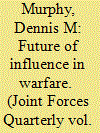

|
|
|
| 14 |
ID:
104710


|
|
|
| 15 |
ID:
135262
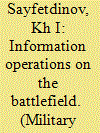

|
|
|
|
|
| Summary/Abstract |
The author looks close up at information operations and their relevance to the Russian Armed Forces and the Country as a whole in peace and wartime; at the need to develop regulations stating the purpose, objectives and underlying principles on which information operations are based as a system; and at their significance in the integrated government and military command and control system
|
|
|
|
|
|
|
|
|
|
|
|
|
|
|
|
| 16 |
ID:
022571
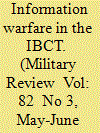

|
|
|
|
|
| Publication |
May-June 2002.
|
| Description |
46-62
|
|
|
|
|
|
|
|
|
|
|
|
|
|
|
|
| 17 |
ID:
150160


|
|
|
| 18 |
ID:
182909
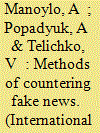

|
|
|
|
|
| Summary/Abstract |
FAKE news has become one of the most dangerous modern global phenomena. The 2016 presidential election campaign in the United States was a turning point in the perception of fake news: The publication and viral spread of disinformation nearly put an end to the rising political career of Donald Trump, who was forced to fiercely fight off lies coming from CNN and other media. Due to its unique ability to practically instantly capture large audiences and manipulate people's minds, fake news was put in the "absolute" weapons category [4]. In 2016, fake news triggered panic, and nobody knew how to thwart it [5] - there were no tested methods to counter it [6]. In modern information operations, fake news is a specialized tool for controlling people's minds and behavior...
|
|
|
|
|
|
|
|
|
|
|
|
|
|
|
|
| 19 |
ID:
138186
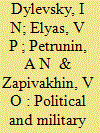

|
|
|
|
|
| Summary/Abstract |
The authors look at the political and military aspects of the Russian Federation's state policy on international information security and the guidelines to be followed to counter military and political threat of aggressive use of information and communication technologies.
|
|
|
|
|
|
|
|
|
|
|
|
|
|
|
|
| 20 |
ID:
153903
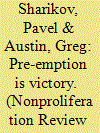

|
|
|
|
|
| Summary/Abstract |
Leading US military figures have discussed the use of pre-emptive cyberattack to disable or disrupt enemy nuclear missiles. While Russia does not appear to have such a highly developed concept, it now sees US plans to disrupt the command and control of its nuclear weapons as the main threat it faces at the strategic level of warfare. Cyberweapons and strategies have brought us to a situation of aggravated nuclear instability that needs to be more explicitly and openly addressed in the diplomacy of leading powers, both in private and in public. This article draws attention to a convergence between Russian interest in pre-emptive attack and reasonable views of Western strategists and scholars that the character of cyberspace favors offense and may encourage pre-emptive action. Since bilateral arms-control regimes for cyberspace are unlikely given the difficulty of verification and escalating US-Russian tension, states should commit to restraint regarding cyberattacks on nuclear military assets.
|
|
|
|
|
|
|
|
|
|
|
|
|
|
|
|